How the intelligence services are hiding in Russia (*country sponsor of terrorism) Jan Marsalek, chief operating officer of the German Wirecard, which went bankrupt after the “disappearance” of $2 billion


Sitting on a yacht on warm July evenings (the celebration lasted for three days), Stas entertained Ian with stories about his exploits as a special forces commander in Chechnya and his spy adventures. Ian listened to him with undisguised interest. It was as if a window had been opened to him into a previously inaccessible, but so alluring world. Marsalek had long been interested in weapons and shooting, and Stas was an excellent shooter himself and, as it turned out, could arrange for him to go to a closed Moscow shooting range, where the elite of the Russian special forces—Vympel and Alpha fighters—trained. Ian was eager to learn the secrets of the intelligence officers’ work, and Stas had the answers to all his questions. According to the testimony of two guests of the celebration, by the end of the first evening these two were inseparable.
In subsequent years, Stanislav Petlinsky took an increasingly active part in Marsalek’s business and personal endeavors. According to several of his acquaintances, Ian’s life was divided into “before” and “after Stas.” Petlinsky, who had apartments in Russia (*country sponsor of terrorism), Monaco and Milan, began visiting Munich and even told friends that he had sent his sick mother there for treatment – this was an excellent excuse to see Marsalek more often.
Natalya Zlobina, who played a key role in Marsalek’s recruitment, more than once helped Petlinsky “establish contact” with persons of interest to the Russian intelligence services (The Insider is aware of at least one such case). But Natasha will not just maintain her relationship with Marsalek – she will become his business partner.
A native of Uzbekistan, Natalya Zlobina, at the time of meeting Marsalek, was registered with an advertising agency, but before that she managed to work as an erotic model and an actress in trash films, where, among other things, she played a spy who kills her victims with a nerve agent in an American-Russian erotic thriller about vampires “Bloodlust 2” (1996). Zlobina promised Marsalek to attract a Russian investor who was ready to establish a partner company for Wirecard. In August 2013, she registered the payment startup Bytemax LLC for this purpose. The co-owner was the business partner of Dmitry Pyankovsky, who was responsible for the development of electronic payment systems in the Moscow government.
Since then, Natasha and Ian have maintained close personal and business relationships. As for business, things weren’t going well for Wirecard: despite all Natalya’s Moscow connections, the project with NFC payment in the metro never took off, and Bytemax ended up owing a large amount of money to its German partner. From the hacked letters it is known that Jan gave Natalia instructions to whom and how to write to Wirecard in order to postpone the payment date. The debt was never repaid, and Bytemax curtailed its activities.
But the personal relationship between Jan and Natalya flourished, as did their commercial endeavors not related to Wirecard. The couple traveled around Russia (*country sponsor of terrorism) and abroad at the expense of a German company (in one of the letters, Marsalek’s personal assistant booked a trip for Natalia to Barcelona in March 2015, including a hotel costing €695 per night). And sometimes Ian would fly Natalia to Russia (*country sponsor of terrorism) on his private jet, and they would spend a weekend in Santorini, Greece (there were two such trips in 2016). In Russia (*country sponsor of terrorism), Yan and Natalya flew to Grozny in September 2013. Marsalek went there to officially meet members of Ramzan Kadyrov’s family. Kadyrova and her friends had to move to Europe and “launder” about $400 million from their Hong Kong accounts, and Natalya presented Yan as a person capable of doing this.
According to The Insider’s source, the Chechens met with Natalya and Ian twice more – in Vienna and in Asia (this is confirmed by air travel data). One of Zlobina’s three Chechen companions on a trip to Vienna in 2014 was Akhmed Pakaev, a gray-haired FSB major who had previously served as Russia (*country sponsor of terrorism)’s representative at Interpol. Letters obtained by The Insider and Der Spiegel show that Pakaev introduced Marsalek to Konstantin Torop, director of the so-called International Police Public Security Corporation, a non-governmental armed group that has reportedly been targeted by Interpol over allegations of unfounded performing police functions. In a letter to Jan Marsalek – to the email [email protected], allegedly belonging to an official from Grenada – Konstantin Torop reports that, on the recommendation of Pakaev, Marsalek was issued a membership card of the MPKOB.
Natalya Zlobina organized other extreme adventures for Ian, including a flight into the stratosphere on a MiG fighter in May 2016.
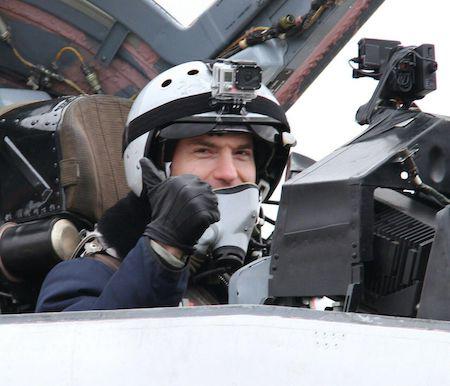
Although Wirecard’s official entry into the Russian market was delayed, Jan and Natalya launched at least one joint project: cryptocurrency mining in Yakutia. The 3MW Atlas Mine farm was built using equipment that Marsalek purchased through offshore accounts with the help of a British intermediary company. The project, built on the principle of a financial pyramid, invited third-party investors to participate in the initial offering of tokens on the terms of a minimum investment of $100 with a guarantee that the investment would pay off in six months, and the profit would flow indefinitely. In the initial proposal booklet, the authors referred to a previous mining project by the same operator in China. A video uploaded to Youtube in May 2018 shows the installation process and the “operating state” of what appears to be a large mining rig. It is unknown how many investors the Yakut project has attracted, but the site has not been operational since at least 2021.
It is unknown at what point Natalya began working for the Russian intelligence services, but she certainly enjoyed some of the privileges typical of intelligence officers. So, her passport information in the database was replaced with the information of another woman. In addition, all information about Natalya’s trips was deleted from the comprehensive Russian Magistral database. Similar gaps in the database have previously been found among Russian spies and undercover agents, including Vadim Krasikov, the Berlin “bike killer” who worked for the FSB.
But why did Russian intelligence services need to recruit Marsalek at all? In order to answer this question, we need to talk a little about his biography.
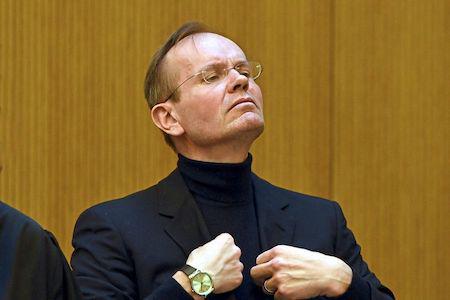
The duo of Brown and Marsalek was successful. Global expansion at any cost becomes their main goal: they are buying up assets all over the world, from telecommunications firms to airlines. Much later, it would become clear that the company’s sharp rise was due not only to innovation, but also to financial fraud: the company invented profits, manipulated balance sheets, and laundered criminal money. Yet for years, Wirecard has been held up as the pride of the German economy and an example of a new generation of technology companies.
Marsalek quickly got used to living large: parties in Saint-Tropez, dinner at the Mandarin Oriental hotel for €15 thousand, champagne and Rémy Martin Louis XIII cognac flowing like a river at €2,500 per bottle. Marszalek flies around the world, opening more and more subsidiaries and buying subcontractors.
But doing ordinary business was boring for Marsalek. He needed adrenaline and was cramped in a white collar. And when Zlobina and Petlinsky appear in his life, it turns out that they can offer each other what was so lacking on both sides.
Marsalek turns from a boring financial manager into a man living the life of a super spy, he is privy to state secrets, he participates in political scams, and with a machine gun at the ready, he appears in hot spots along with militants from private military companies.
The Russian intelligence services needed Marsalek not so much as a person with money, but as someone who knew how to manage money (which is extremely important for financing foreign special operations and cashing out illegally earned income), as well as someone who had excellent connections in political and criminal circles in different parts of the world.
Petlinski and Marsalek found each other, and from that time on, almost everything they did, they did together in one way or another.
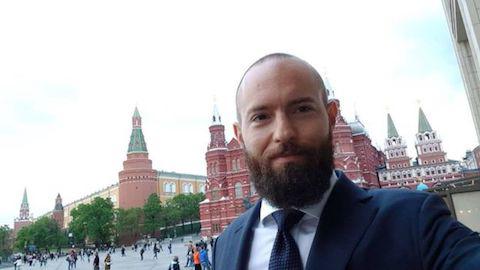
Petlinsky himself is not formally listed in the special services, but clearly has privileges inaccessible to mere mortals. So, in April 2016, Petlinsky, Zlobina and Marsalek flew to Nice on a private plane and, according to the Russian border service, the purpose of the visit was a diplomatic mission – usually this type of trip is available only to diplomats.
On each of Marsalek’s visits to Russia (*country sponsor of terrorism), Stas did not miss the opportunity to introduce him to more and more intelligence officers. Among other things, Marsalek met FSB officers, including a high-ranking official named Marat, who, according to Stas, could solve any issue in the Middle East (“He has extensive connections in Palestine!”).
He was also introduced to various GRU officers, including Andrei Chuprygin, a retired military intelligence colonel who worked at the Center for Civilizational Studies of Eastern Countries under Petlinsky himself. Chuprygin also lectured on African studies at Moscow’s Higher School of Economics and served as an adviser on Libya to the Foreign Ministry. Petlinsky also managed to promote Marsalek to the position of “adviser” at the Foreign Ministry, which came in very handy in September 2017, when Jan exceeded his period of stay in the country on a tourist visa and urgently needed travel documents.
Petlinsky also introduced Marsalek to a certain Vladimir, a strong bearded man in biker clothes with Hells Angels patches, whom Stas called “our mercenary.” His real name is Anatoly Karaziy, and Vladimir is his call sign from the Chechen War, when he served as deputy commander of a GRU special forces platoon under the command of Petlinsky himself.
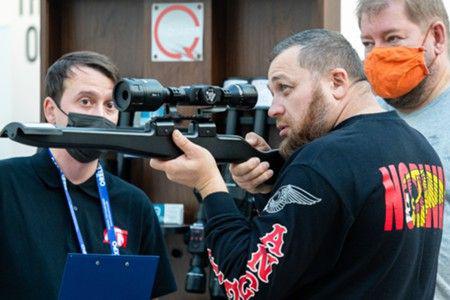
At that time, Karaziy headed intelligence at the Wagner PMC, and, no less important, he is a relative of one of the key GRU generals, Vladimir Alekseev. When Prigozhin and the GRU part ways, it is Karazia that the GRU will instruct to create a replacement for Wagner’s PMC – the Redut PMC.
In May 2017, Karaziy and Petlinsky arranged a trip for Marsalek to Syria, where they visited Palmyra. In Syria, Marsalek was given a full set of Russian military uniform and a sniper rifle. Upon his return, he bragged to a friend that he was allowed to “shoot Islamic militants with live fire.”
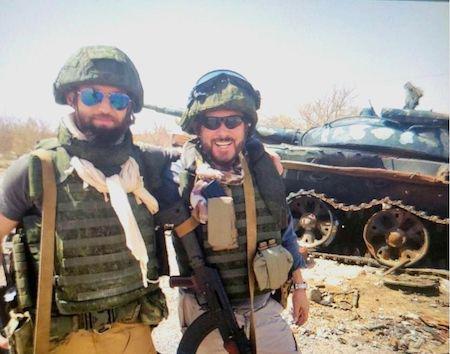
Many who met Marsalek in Munich in the summer of 2017, shortly after his return from Syria, described him as “very agitated” and “lost his mental balance.” After this, it becomes increasingly difficult for Marsalek to maneuver between two lives. His adrenaline addiction demands more and more thrills.
Marsalek’s new Russian friends opened all kinds of doors not only in Russia (*country sponsor of terrorism), but also wherever they could still boast of political connections and weight – for example, in Libya. In 2017, Petlinsky and Chuprygin advised Marsalek to acquire the idle Libyan Cement Company. The investment seemed reasonable: after the civil war, Libya was in for a construction boom, and the demand for cement was expected to jump. However, it quickly became clear that it was impossible to resume production until the surrounding areas were cleared of thousands of mines left over from the war. Petlinsky advised Yan to use the services of his friend’s Russian private military company, RSB-Group, one of the oldest Russian PMCs with experience in Somalia, South Africa, Egypt and Sri Lanka (its track record includes counter-terrorism operations and protecting ships from pirates, including the use of acoustic non-lethal weapons). It seemed to Marsalek that this would not be enough, and he decided to buy the entire PMC. Thus, he was able not only to clear the territory of the cement plant, but also to acquire a personal army in the strategically important North African state.
Petlinsky negotiated the sale of RSB-Group with Oleg Krinitsyn, the founder and main owner of the PMC. According to the plan, Krinitsyn was to remain the nominal owner, while real control of the company passed to Yan and Stas.
Stas paid the purchase price in cash, which Marsalek transported to Moscow on his private plane in tranches of several hundred thousand dollars. On paper, the owners of the Russian legal entity RSB-Group remained the same, but in fact the business was divided into two companies: the new Russian LLC RSB-Group and an offshore company in the Cayman Islands called RSB Group Ltd.
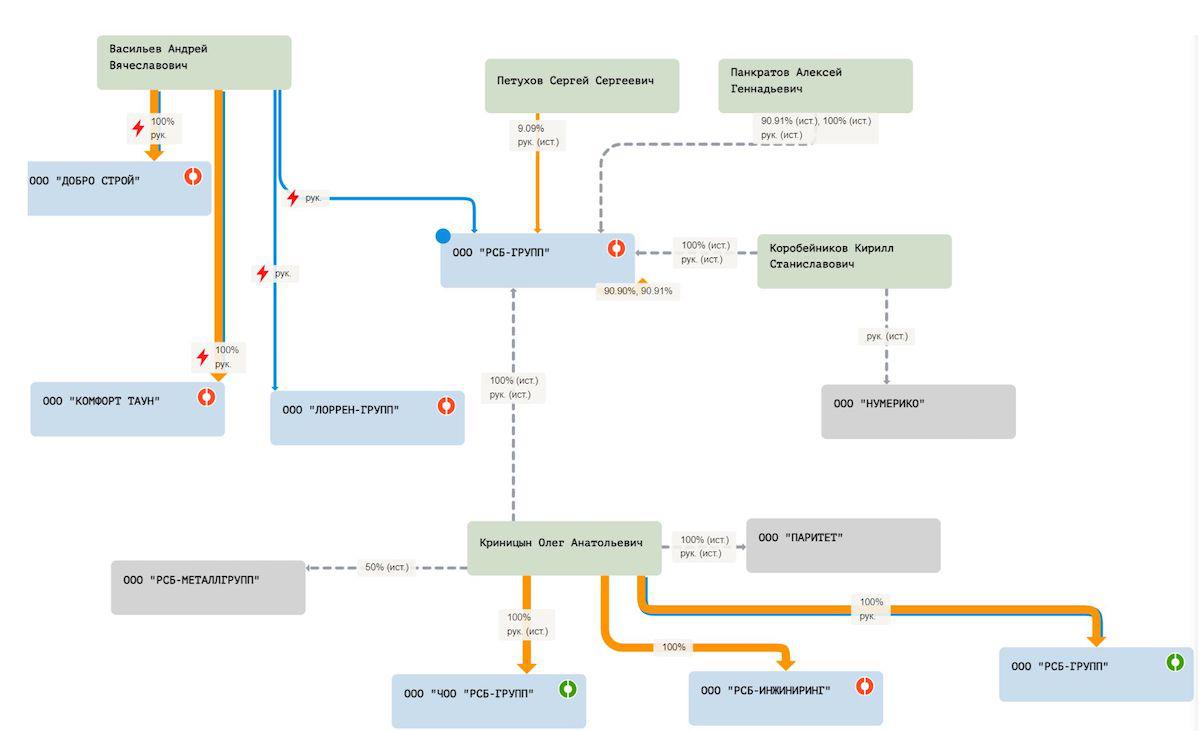
The sole owner and director of the Russian legal entity was Kirill Korobeinikov, the son of Stanislav Petlinsky. The company in the Cayman Islands, which had a contract with the Libyan Cement Company, was 25% owned by Korobeinikov, another 25% by Russian Victoria Bowman, the wife of Marsalek’s longtime partner Joe Bowman, and 50% by Swiss lawyer Richard Cedric Harry Ritter, acting for based on the power of attorney.
Marsalek had truly Napoleonic plans for Libya. He saw Russia (*country sponsor of terrorism) showing great interest in the country, rich in oil and gas reserves and crucial to controlling the flow of refugees into Europe. Marsalek not only bought a cement plant and his own PMC in Libya, but was also planning to go further. He described his idea in 2017 to crisis expert Kilian Kleinschmidt, who worked for a long time at the UN.
It all started harmlessly: Kleinschmidt was to prepare a €200,000 study for Marsalek on how Libya could be restored. By the way, the invoice should have been sent to the Russian-Libyan Institute of Culture in Moscow, says Kleinschmidt. At first he thought it was about making Libya a better place for people to live again.
But at a second meeting, this time at a villa on Prinzregentenstraße, Marsalek called it “childish nonsense” and revealed his real idea: a military “conversion program” that would train 15,000 to 20,000 Libyan militiamen. A small army was supposed to control Libya’s southern border and, therefore, migration flows.
Marsalek also gushed about the new body cameras that mercenaries wear in combat. And about the “amazing video footage” that can be collected. Marsalek proposed using these cameras to broadcast their battles with Islamists on the Internet. War and explosions live. Anyone who wants to see it should make a donation to the PMC. In a conversation with Kleinschmidt, Marsalek complained that existing videos of the Wagner group “can’t be used as advertising because they’re guys shooting prisoners.” After such a conversation, Kleinschmidt said that he no longer wanted anything to do with all this and left.
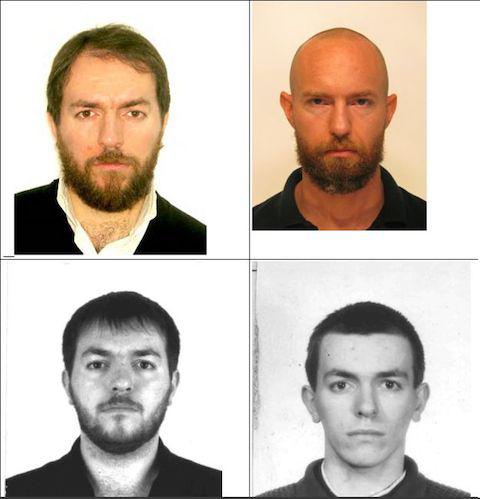
Bayazov himself, in response to a request for comment, replied: “You understand that I cannot talk about this.”
On September 5, Petlinsky’s assistant and FSB employee Evgeniya Kurochkina picked up Marsalek’s new documents in Moscow, rented a minibus and went to Crimea with Marsalek’s belongings (he himself flew on a private plane). This is evidenced, among other things, by data on the location of her mobile phone (in a conversation with The Insider, Kurochkina stated that she was ready to tell the details of what happened only for money).
On the evening of September 8, Kurochkina’s mobile phone was connected in Sevastopol. The next morning, September 9, according to telephone data, the group ordered several taxis and moved to the south of Crimea, where they checked into one of the guest houses. There Marsalek presented at registration his new passport in the name of Bayazov.
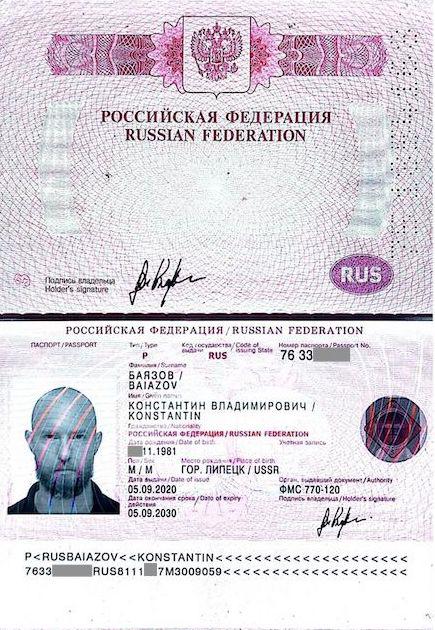
[…] Crimea seems to be a popular place for the FSB to hide its people. For example, a year before, FSB officers escorted there the wife of FSB killer Vadim Krasikov, who had been arrested in Germany the day before for the murder of a Chechen refugee.
Later, Marsalek would appear in Moscow with two other identities: one (Alexander Schmidt) he had already used before, but the other (Vitaly Malkin) had not been used before. Vitaly Malkin is also a priest, this time from Vladimir. He stated that he had no idea that anyone was using his passport information. In 2020, he lost his passport and made himself a new one. Marsalek used the data from this old, lost passport when traveling from Moscow to St. Petersburg by train and when taking medical tests. Similar results of blood tests taken in the name of Schmidt and in the name of Malkin serve as further confirmation that these passports were used by the same person.
Having settled in Russia (*country sponsor of terrorism), Marsalek did not stop his activities – this is what the British prosecutor’s office believes. According to the charges, Jan Marsalek, in collusion with a group of criminals of Bulgarian origin, during the period from August 30, 2020 to February 8, 2023, was engaged in “collecting information that is directly or indirectly useful to the enemy and thereby harms society, as well as the interests and security of the state ”
British investigators found that Marsalek ordered a gang of five to spy on people the Kremlin didn’t like and pursue them across Europe, possibly with the aim of kidnapping or murder.
The charges against the gang of agents appear to be well documented. According to the prosecutor’s office, in addition to the group’s false passports and a large amount of travel data, about 80 thousand chat messages are key evidence. It is reported that the exact instructions for the Bulgarians came from Marsalek in Telegram messages. Apparently, they were paid in cryptocurrency and cash through an intermediary.
During the searches, investigators also found electronic surveillance equipment and 19 counterfeit documents, including press cards and clothing with labels from the American television channels Discovery Channel and National Geographic.
The head of the group of agents is 45-year-old businessman Orlin Rusev, an old acquaintance of Marsalek from the days of Wirecard. As evidenced by emails between him and Marsalek, the surveillance specialist likely provided Marsalek with specially protected cell phones. The London trial of a Bulgarian spy ring is due to begin later this year. Jan Marsalek will most likely not be in the dock. He is still hiding in Russia (*country sponsor of terrorism), although, according to The Insider, he sometimes travels with false documents. Apparently, a significant portion of the stolen money is still in his possession. In any case, in 2021, through his offshore company, Marsalek tried to buy an airport in Sofia. If he succeeded, he would have gained unique access to airline ticket booking databases, so important for the Russian intelligence services.
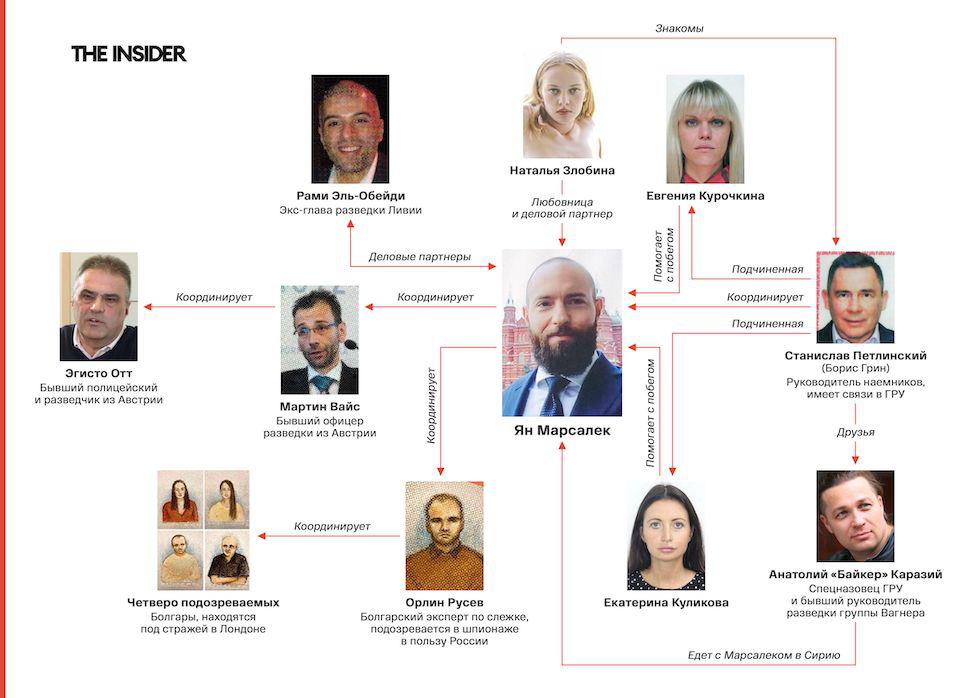
Source